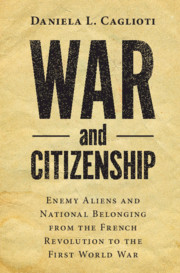 War and Citizenship
War and Citizenship A Prolonged State of Emergency?
from Part III - Aftermath
Published online by Cambridge University Press: 30 October 2020
This concluding chapter summarizes the book arguments and reflects on the legacies of the war, the problems at restoring business as usual after a long period of state of exception, and the difficulties of squaring sovereignty, national interests, humanity and human rights. The war and its aftermath profoundly changed the population structure of vast territories and generated a proliferation of migration control policies and new citizenship claims from those who had fought on the battlefront or suffered because of the war. It reshaped economic relationships and the balance of power and had a big impact on reorienting migration flows. The First World War marked a departure from the quest for the universalism of rights and a shift from individuals to collectivities defined in terms of identity, belonging, language, ethnicity, religion or class. Establishing the equation between aliens and dangerousness, the First World War consolidated the idea that policing borders, selecting those who can live in the territory of a country, expelling the unwanted, preventing them from entering, granting and stripping people of their citizenship were (and after the war continued to be) the main prerogatives of the sovereign state, which had the power to decide whom to accept, expel, grant asylum to, include, exclude and endow with rights.
To save this book to your Kindle, first ensure no-reply@cambridge.org is added to your Approved Personal Document E-mail List under your Personal Document Settings on the Manage Your Content and Devices page of your Amazon account. Then enter the ‘name’ part of your Kindle email address below. Find out more about saving to your Kindle.
Note you can select to save to either the @free.kindle.com or @kindle.com variations. ‘@free.kindle.com’ emails are free but can only be saved to your device when it is connected to wi-fi. ‘@kindle.com’ emails can be delivered even when you are not connected to wi-fi, but note that service fees apply.
Find out more about the Kindle Personal Document Service.
To save content items to your account, please confirm that you agree to abide by our usage policies. If this is the first time you use this feature, you will be asked to authorise Cambridge Core to connect with your account. Find out more about saving content to Dropbox.
To save content items to your account, please confirm that you agree to abide by our usage policies. If this is the first time you use this feature, you will be asked to authorise Cambridge Core to connect with your account. Find out more about saving content to Google Drive.